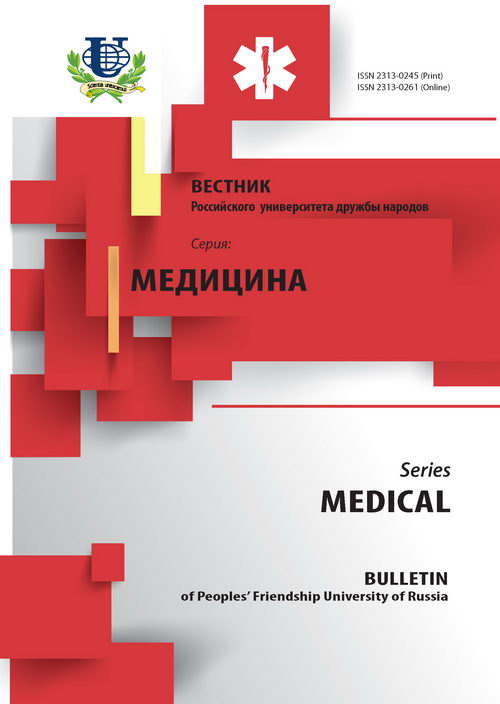Дистрофические болезни промежности в менопаузальном периоде
- Авторы: Блбулян Т.А.1, Климова О.И.1, Погасов А.Г.1, Сохова З.М.1
-
Учреждения:
- Российский университет дружбы народов
- Выпуск: № 2 (2016)
- Страницы: 133-137
- Раздел: Статьи
- URL: https://journals.rudn.ru/medicine/article/view/3341
- ID: 3341
Цитировать
Полный текст
Аннотация
Дистрофические процессы вульвы были и остаются проблемой как практической, так и теоретической медицины. Несмотря на значительные достижения на основе открытий фундаментальной медицины, вопросы этиопатогенеза продолжают оставаться не до конца ясными. Предполагается, что более углубленное изучение процессов старения кожи концептуально может изменить наше понимание патологических, в данном случае дистрофических изменений кожи вульвы и влагалища. Открытыми остаются методы коррекции, хотя определенный прогресс в этом налицо.
Ключевые слова
Об авторах
Татевик Арменовна Блбулян
Российский университет дружбы народов
Email: tblbulyan@gmail.com
Ольга Ивановна Климова
Российский университет дружбы народов
Email: koiv01@mail.ru
Александр Георгиевич Погасов
Российский университет дружбы народов
Email: blbulyan@gmail.com
Залина Михайловна Сохова
Российский университет дружбы народов
Email: blbulyan@gmail.com
Список литературы
- Bornstein J., Sideri M., Tatti S. et al. Terminology of the Vulva of the International Federation for Cervical Pathology and Colposcopy. Journal of Lower Genital Tract Disease. 2012. V. 16. Iss. 3. P. 290-295.
- Calleja-Agius J., Brincat M., Borg M. Skin connective tissue and ageing. Best Practice & Research Clinical Obstetrics & Gynaecology. 2013. V. 27. P. 727-740.
- Da Silva D., Woodham A., Naylor P. et al. Immunostimulatory Activity of the Cytokine-Based Biologic, IRX-2, on Human Papillomavirus-Exposed Langerhans Cells. J. Interferon Cytokine Res. 2015.
- Doyen J., Demoulin S., Delbecque K. et al. Vulvar Skin Disorders throughout Lifetime: About Some Representative Dermatoses. BioMed Research International. 2014. V. 2014.
- Ferreira da Silva W., Pagliari C., Duarte M. et al. Paracoccidioides brasiliensis interacts with dermal dendritic cells and keratinocytes in human skin and oral mucosa lesions. Med. Mycol. 2016.
- Fistarol K., Itin P. Diagnosis and Treatment of Lichen Sclerosus. American Journal of Clinical Dermatology. 2013. V. 14. Iss. 1. P. 27-47.
- Gynecology: textbook. Ed. by V.E. Radzinksy, A.M. Fuks. GEOTAR-Media, 2015. P. 460.
- Liu G., Cao F., Zhao M. et al. Associations between HLA-A\B\DRB1 polymorphisms and risks of vulvar lichen sclerosus or squamous cell hyperplasia of the vulva. Genet. Mol. Res. 2015. V. 14. Iss. 4.
- McPherson T., Cooper S. Vulvar lichen sclerosus and lichen planus. Dermatologic Therapy. 2010. V. 23. P. 523-532.
- Nair P. Dermatosis associated with menopause. Journal of Mid-Life Health. 2014. V. 5(4). P. 168-175.
- Naylor E., Watson R., Sherratt M. Moleculaar aspects of skin ageing. Maturitas. 2011. V. 69. Iss. 3. P. 249-256.
- Naswa S., Marfatia Y. Physician-administered clinical score of vulvar lichensclerosus: A study of 36 cases. Indian Journal of Sexually Transmitted Diseases. 2015. V. 36. Iss. 2. P. 174-177.
- Novis C., Lima L., D’Acri A. et al. Disseminated lichen sclerosus in a child: a case report. Anais Brasileiros de Dermatologia. 2015. V. 90. Iss. 2. P. 283-284.
- New terminology of vulvar squamous intraepithelial lesions [electronic resource]. The XXIII World Congress. New York, 2015.
- Oh J., Kim Y., Jung J. et al. Intrinsic aging- and photoaging - dependent level changes of glycosaminoglycans and their correlation with water content in human skin. Journal of Dermatological Science. 2011. Vol. 62. Iss. 3. P. 192-201.
- Papakonstantinou E., Roth M., Karakiulakis G. Hyaluronic acid: A key molecule in skin aging. Dermato-endocrinology. 2012. Vol. 4. Iss. 3. P. 253-258.
- Brown L. Pathology of the vulva and vagina. Springer London, 2013. P. 1-11.
- Salvatore S., Nappi R., Zerinati N. et al. A 12-week treatment with fractional CO2 laser for vulvovaginal atrophy: a pilot study. Climacteric. 2014. Vol. 17. Iss. 4.
- Sandu C., Dumas M., Malan A. et al. Human skin keratinocytes, melanocytes, and fibroblasts contain distinct circadian clock machineries. Cellular and Molecular Life Sciences. 2012. Vol. 69. Iss. 19. P. 3329-3339.
- Sikdar S., Papadopoulou M., Dubois J. What do we know about sulforaphane protection against photoaging? J. Cosmet. Dermatol. 2016.
- Farage M., Miller K., Maibach H. Textbook of aging skin. Springer Berlin Heidelberg, 2010. P. 1127-1135.
- Thornton J. Estrogens and aging skin. Dermato-Endocrinology. 2013. Vol. 5. Iss. 2. P. 264-270.
- Van de Nieuwenhof H., Bulten J., Hollema H. Differentiated vulvar intraepithelial neoplasia is often found in lesions, previously diagnosed as lichen sclerosus, which have progressed to vulvar squamous cell carcinoma. Modern Pathology. 2011. Vol. 24. P. 297-305.
Дополнительные файлы















